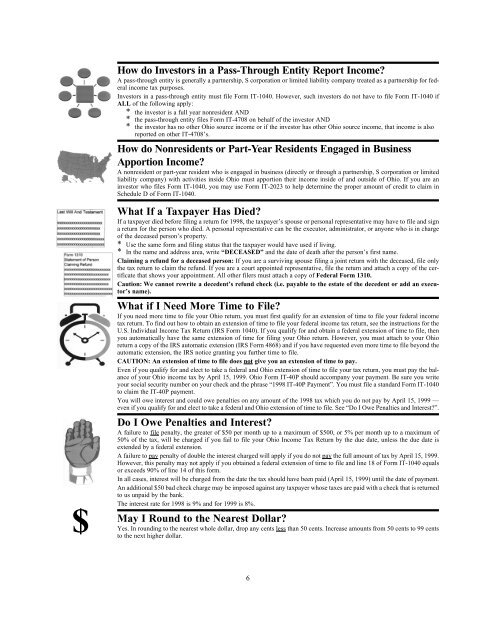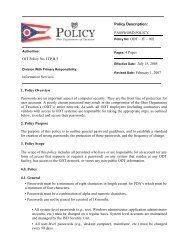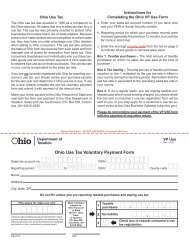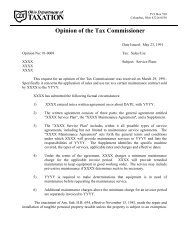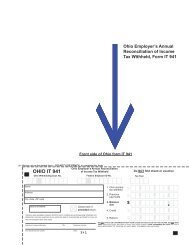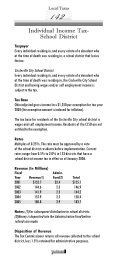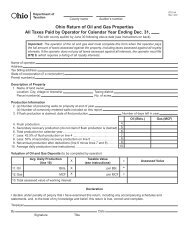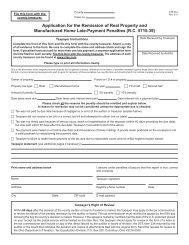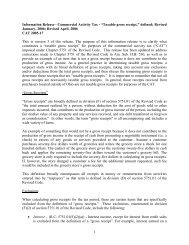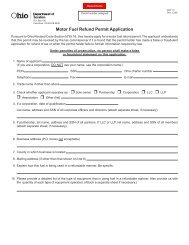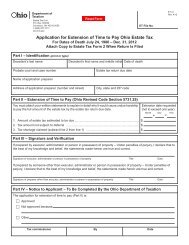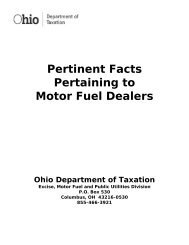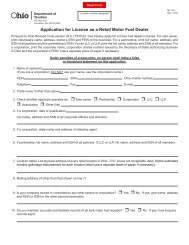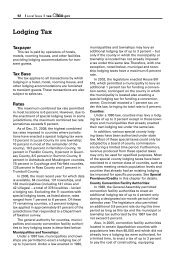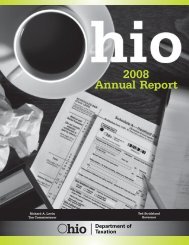bw98-TAX BOOK.QUARK FILE - Ohio Department of Taxation ...
bw98-TAX BOOK.QUARK FILE - Ohio Department of Taxation ...
bw98-TAX BOOK.QUARK FILE - Ohio Department of Taxation ...
You also want an ePaper? Increase the reach of your titles
YUMPU automatically turns print PDFs into web optimized ePapers that Google loves.
$<br />
How do Investors in a Pass-Through Entity Report Income?<br />
A pass-through entity is generally a partnership, S corporation or limited liability company treated as a partnership for federal<br />
income tax purposes.<br />
Investors in a pass-through entity must file Form IT-1040. However, such investors do not have to file Form IT-1040 if<br />
ALL <strong>of</strong> the following apply:<br />
* the investor is a full year nonresident AND<br />
* the pass-through entity files Form IT-4708 on behalf <strong>of</strong> the investor AND<br />
* the investor has no other <strong>Ohio</strong> source income or if the investor has other <strong>Ohio</strong> source income, that income is also<br />
reported on other IT-4708’s.<br />
How do Nonresidents or Part-Year Residents Engaged in Business<br />
Apportion Income?<br />
A nonresident or part-year resident who is engaged in business (directly or through a partnership, S corporation or limited<br />
liability company) with activities inside <strong>Ohio</strong> must apportion their income inside <strong>of</strong> and outside <strong>of</strong> <strong>Ohio</strong>. If you are an<br />
investor who files Form IT-1040, you may use Form IT-2023 to help determine the proper amount <strong>of</strong> credit to claim in<br />
Schedule D <strong>of</strong> Form IT-1040.<br />
What If a Taxpayer Has Died?<br />
If a taxpayer died before filing a return for 1998, the taxpayer’s spouse or personal representative may have to file and sign<br />
a return for the person who died. A personal representative can be the executor, administrator, or anyone who is in charge<br />
<strong>of</strong> the deceased person’s property.<br />
* Use the same form and filing status that the taxpayer would have used if living.<br />
* In the name and address area, write “DECEASED” and the date <strong>of</strong> death after the person’s first name.<br />
Claiming a refund for a deceased person: If you are a surviving spouse filing a joint return with the deceased, file only<br />
the tax return to claim the refund. If you are a court appointed representative, file the return and attach a copy <strong>of</strong> the certificate<br />
that shows your appointment. All other filers must attach a copy <strong>of</strong> Federal Form 1310.<br />
Caution: We cannot rewrite a decedent’s refund check (i.e. payable to the estate <strong>of</strong> the decedent or add an executor’s<br />
name).<br />
What if I Need More Time to File?<br />
If you need more time to file your <strong>Ohio</strong> return, you must first qualify for an extension <strong>of</strong> time to file your federal income<br />
tax return. To find out how to obtain an extension <strong>of</strong> time to file your federal income tax return, see the instructions for the<br />
U.S. Individual Income Tax Return (IRS Form 1040). If you qualify for and obtain a federal extension <strong>of</strong> time to file, then<br />
you automatically have the same extension <strong>of</strong> time for filing your <strong>Ohio</strong> return. However, you must attach to your <strong>Ohio</strong><br />
return a copy <strong>of</strong> the IRS automatic extension (IRS Form 4868) and if you have requested even more time to file beyond the<br />
automatic extension, the IRS notice granting you further time to file.<br />
CAUTION: An extension <strong>of</strong> time to file does not give you an extension <strong>of</strong> time to pay.<br />
Even if you qualify for and elect to take a federal and <strong>Ohio</strong> extension <strong>of</strong> time to file your tax return, you must pay the balance<br />
<strong>of</strong> your <strong>Ohio</strong> income tax by April 15, 1999. <strong>Ohio</strong> Form IT-40P should accompany your payment. Be sure you write<br />
your social security number on your check and the phrase “1998 IT-40P Payment”. You must file a standard Form IT-1040<br />
to claim the IT-40P payment.<br />
You will owe interest and could owe penalties on any amount <strong>of</strong> the 1998 tax which you do not pay by April 15, 1999 —<br />
even if you qualify for and elect to take a federal and <strong>Ohio</strong> extension <strong>of</strong> time to file. See “Do I Owe Penalties and Interest?”.<br />
Do I Owe Penalties and Interest?<br />
A failure to file penalty, the greater <strong>of</strong> $50 per month up to a maximum <strong>of</strong> $500, or 5% per month up to a maximum <strong>of</strong><br />
50% <strong>of</strong> the tax, will be charged if you fail to file your <strong>Ohio</strong> Income Tax Return by the due date, unless the due date is<br />
extended by a federal extension.<br />
A failure to pay penalty <strong>of</strong> double the interest charged will apply if you do not pay the full amount <strong>of</strong> tax by April 15, 1999.<br />
However, this penalty may not apply if you obtained a federal extension <strong>of</strong> time to file and line 18 <strong>of</strong> Form IT-1040 equals<br />
or exceeds 90% <strong>of</strong> line 14 <strong>of</strong> this form.<br />
In all cases, interest will be charged from the date the tax should have been paid (April 15, 1999) until the date <strong>of</strong> payment.<br />
An additional $50 bad check charge may be imposed against any taxpayer whose taxes are paid with a check that is returned<br />
to us unpaid by the bank.<br />
The interest rate for 1998 is 9% and for 1999 is 8%.<br />
May I Round to the Nearest Dollar?<br />
Yes. In rounding to the nearest whole dollar, drop any cents less than 50 cents. Increase amounts from 50 cents to 99 cents<br />
to the next higher dollar.<br />
6


